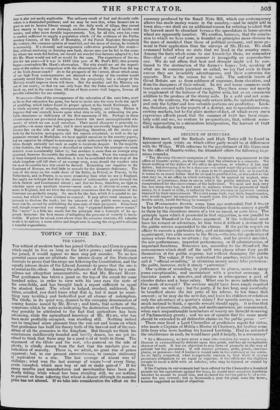TOPICS OF THE DAY.
THE CROPS.
Tut wittiest of modern bards has joined Catholics and Corn in a poem which ought to live as long as the latter grows ; and what MOORE has joined, it would appear no man may put asunder. To no less powerful cause can we attribute the intense desire of the Protestant Journals to prove that the crops are following the Constitution, and the equally intense desire of the Liberal Journals to prove that the one is as sound as the other. Among the adherents of the former, by a coincidence not altogether unaccountable, we find Mr. HENRY HUNT. That gentleman has taken a jaunt on the top of the coach for some hundred miles, in order to view with his own eyes the state of the corn-fields, and has brought back a report sufficient to appal the stoutest heart. The wheat is lodged, crushed, mildewed, flybitten, acralled, (we don't know what that is, but it must be something very terrible,) and bedeviled past all chance of redemption. The Globe, in its quiet way, demurs to the sweeping denunciation of coming famine issued by Mr. HUNT; and hints, that certain of the symptoms which he notes as indicating the destruction of the country, may possibly be attributed to the Fact that agriculture has been advancing, while the agricultural knovvlege of Mr. HUNT, who has been more profitably occupied, was standing still. Nothing indeed can he imagined more pleasant than the run out and home on which that gentleman has built his theory both of the harvest and of the condition of all the granaries in the kingdom. But though we think his conclusions indifferently founded and hastily drawn, we are yet inclined to think that there may be a good deal of truth in them. The argument of the Globe and the rest, who contend on the side of plenty, is chiefly drawn from the fact that the markets give no indication of scarcity. There is, we admit, no great rise of prices apparent; but, in our present circumstances, to remain stationary 3sequivalent to a rise. The last average of wheat was 67 shillings ; what was the last average of wages ?—of every thing, grain excepted, which men buy or sell or make gain of ? If for many months past manufactures and merchandise have been gradually falling, while wheat has been standing still, we see nothing to prevent us from inferring that wheat is dearer although its nominal price has not altered. If we take into consideration the effect on the currency produced by the Small Note Bill, which our contemporary allows has made money scarce in the country,—and he might add in town also,—we shall see an additional reason for refusing to admit that the harvest must be abundant because the speculators in home-grown wheat are apparently inactive. We confi!ss, however, that the conchtsion to which we have come, is founded on principles snore obvious to the mass of mankind than those of political economy, and more general in their application than the surveys of Mr. HUNT. We shall command belief when we state that we lived in the country once. Among the facts wh:ch came to our knowledge there, we remember this—that a cold and wet summer is inca0ably an unproductive one. We do not affirni that heat and drought might not be continued to the destruction of the farmer's hopes ; but, speaking of what are in common parlance so called, we say that even in their excess they are invariably advantageous, and their contraries the opposite. Nor is the reason far to seek. The unfertile tracts of Great Britain are SD from coldness of exposure, from elevation, and from the dampness of their subsoil. In dry and warm summers such tracts are covered with luxuriant crops. They then come not merely in supplement Of the failures of the lighter soils, but as :in enormous addition to the produce of the strong soils. In a cold and wet summer, on the contrary, the strong soils return little, the uplands nothing, and only the lighter and less valuable portions are productive. Looking, therefore, not to the reports of a district, nor to speculations concerning markets, but to the plain matter-of-fact, of which every one's experience affords proof, that the summer of 1829 has been singularly cold and wet, we venture to prognosticate, that, without something approaching to a miraculous interposition, the harvest of 1829 will be decidedly scanty.


















 Previous page
Previous page